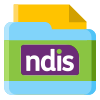
This plan is prepared by a speech pathologist and identifies the client’s risk of choking. It identifies any swallowing issues a client may have. It looks at potential risks to the client from poor eating habits. Such as a client who eats too fast, does not chew their food enough, poor head position when eating, or a client who likes to talk whilst eating etc.
This plan outlines the desired texture and consistency of a client’s food and drink. It identifies any environmental factors that may be contributing to the risk of the client choking. Such as the client turning their head to watch television, poor seating position, or a client overfilling their spoon.

This plan is prepared by a speech pathologist and identifies the client’s risk of choking. It identifies any swallowing issues a client may have. It looks at potential risks to the client from poor eating habits.
Such as a client who eats too fast, does not chew their food enough, poor head position when eating, or a client who likes to talk whilst eating etc.
This plan outlines the desired texture and consistency of a client’s food and drink. It identifies any environmental factors that may be contributing to the risk of the client choking. Such as the client turning their head to watch television, poor seating position, or a client overfilling their spoon.

This plan will also identify any additional aids the client needs to use to assist them when eating and drinking. (Such as a special spoon, plate or cup, non- slip mats etc.) When implementing a new mealtime management plan often data collection is required to be collected. The kind of information collected could be around whether a client coughs a lot during or after a meal, whether a client vomits after eating, eats very slowly or too quickly, or does not appear to chew their food properly, food spills out their mouth when eating, the client overfills their mouth before swallowing what is already in the mouth etc.

The collection of the data and the plan itself along with a report from your speech pathologist will also assist with NDIS goals around the client’s needs for speech pathology funding. Often data collection will show what other interventions have been tried in the past and what worked and what didn’t work. The data collection should also reflect any changes in their swallowing and eating habits.
The speech pathologist report should outline the impact on the client of their swallowing issues and the risks to the client by not having these supports in place. This information can be used as evidence to support a claim under a client’s NDIS Plan.

The collection of the data and the plan itself along with a report from your speech pathologist will also assist with NDIS goals around the client’s needs for speech pathology funding. Often data collection will show what other interventions have been tried in the past and what worked and what didn’t work. The data collection should also reflect any changes in their swallowing and eating habits.

The speech pathologist report should outline the impact on the client of their swallowing issues and the risks to the client by not having these supports in place. This information can be used as evidence to support a claim under a client’s NDIS Plan.
We can assist you with all your case management needs and can help you maxmize your funding you receive from your NDIS Plan

In the event of a medical emergency a client’s care plans and case management form an excellent resource for medical staff to treat a client. The care plans outline what care a client is currently receiving and a client’s medical history.

Plans document what treatments have been implemented for a client both their current interventions as well as past interventions. This assists medical and other specialists in determining a treatment plan for the client. It informs them on what worked for the client previously and what has not worked.

By having the client’s care requirements documented it also provides the information to medical and other specialists on the other treatments a client may be receiving from another specialist. This means that all specialists are working collaboratively to provide the best quality of care for the client.

The care plans and data collection process are an excellent source of information that can be provided as supporting evidence for a claim under a client’s NDIS Plan.

It outlines the client’s current care requirements. It informs care staff on what conditions the client has and how they need to manage the client’s care.
